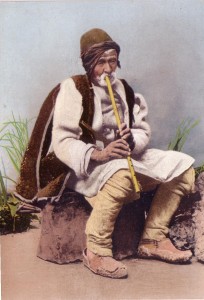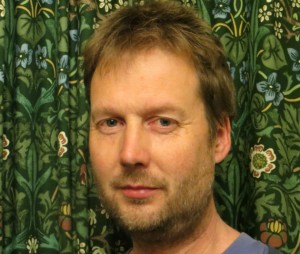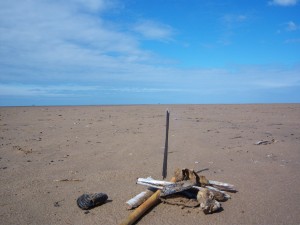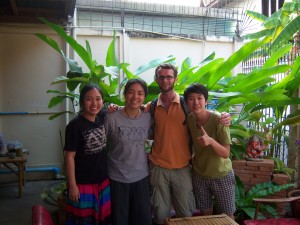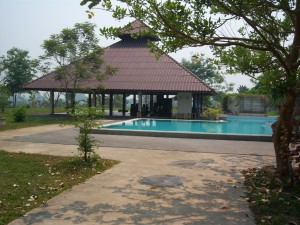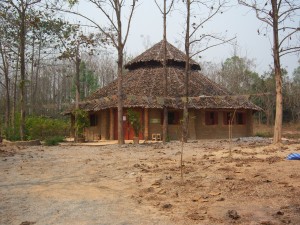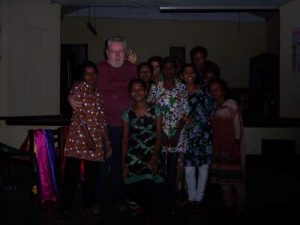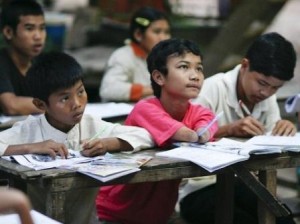Desplácese hacia abajo para la traducción española de Antonio García
Playback Theatre is practiced in many countries worldwide with Spain being one of the notable exceptions in Europe. I had been thinking for some time about how I could contribute to the establishment of Playback Theatre there when I received an email in January about a proposed theatre event. The email was from Ana Fernández and the event was the Encuentro De Teatros De Transformacion to be held in Salamanca July 4 – 6th. I emailed back to Ana and said that I’d like to come and eventually offered two workshops, an Introduction to Playback Theatre and Dancing your story (my Biodanza / Playback Theatre hybrid). What was interesting was that Ana doesn’t speak English and I don’t speak Spanish, so all our co-ordination was conducted by email using google-translate.
I decided to spend the week in Spain and as the event was in northern Spain and I’d always wanted to visit Santiago de Compestela, I thought I’d begin there. As the direct flights were all early and inconvenient, I had the bright idea of flying to Oporto in Portugal and taking the bus from there to Santiago. I hadn’t reckoned on the actual distance and it’s a 6 hour bus ride at a cost of 30 euros. I slept for most of the journey – pointless really.
Santiago is an interesting town and is the destination of the St. James pilgrimage. As I wandered around, many pilgrims were arriving. I spent my 65th birthday in Santiago on my own knowing that I would be able to celebrate it again with my then unknown new Spanish friends. I just had a simple two-course meal, soup and fish, in a small non-touristy restaurant.
My communication problems were to develop when I was unable to access my email and my mobile phone had no signal so I couldn’t text. The only contact I had was Ana’s phone number. In the end, I asked at the Tourist Office and they made a phone call to Ana on my behalf letting her know when I would arrive in Salamanca, which was about a day away by train. Ana met me at the station with her son, Angel Salinas Fernández acting as translator and they drove me to my accommodation at the El Colegio Arzobispo Fonseca, a beautiful old building dating from the 16th century and a very generous gesture from Ana who was providing accommodation in exchange for my participation. I was joined there by other Playback practitioners, Jutta Heppekausen from Freiburg in Germany and Jose Marques and Antonio Vicente from Lisbon.
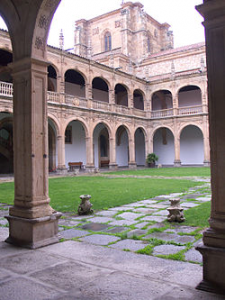
El Colegio Arzobispo Fonseca
Salamanca is such an elegant city with its squares and medieval buildings and made a fantastic backdrop to the event including an outdoor performance by some of the group members on the steps of a church on a balmy Spanish evening.
The Spanish people that I met at the event along with others from Argentina, Brazil, Cuba, Portugal, Uruguay and my translator Luisa originally from Mexico were so warm and friendly.
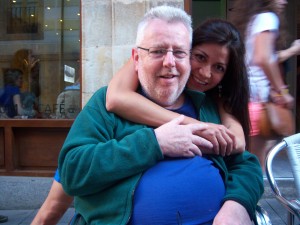
After my birthday party with my translator Luisa
After the opening ceremony, my Introduction to Playback Theatre was one of the first workshops and as participants were new to Playback, I did a ‘typical’ Playback Theatre workshop with warm-up games, some social mapping, fluid sculpts, pairs and a couple of stories to demonstrate the all-important Playback ritual. The lack of exposure in Spain to Playback Theatre meant that there was some conflation with other forms of improvised theatre. It’s a theme among Playback practitioners to make that distinction clear – something of a mission at times.
One thing that I had to get used to was the timing of Spanish meals, a late lunch and a very late dinner. My second workshop Dancing your story on the second day was due to begin at 4pm and we were still having lunch at that time!
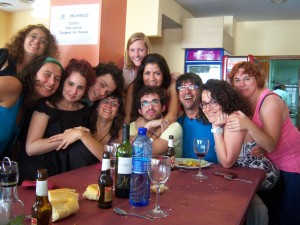
After Lunch!
Dancing your story is a method of integrating emotional awareness through dance and movement with its roots in Biodanza and Latin American culture; it’s designed to be emotional, affectionate and tactile and consequently it was well-received as that was exactly the nature of the participants.
Following on from my solitary birthday in Santiago, a special celebration was organised by Ana on my behalf one evening which I much appreciated. My new Spanish friends took me to their hearts, so warm, loving and affectionate; there is something special about belonging to a group that is so warm that reflects the ideal inclusiveness that is at the heart of Playback Theatre. I have fond memories of my visit and I hope to be able to continue to support the development of Playback Theatre in Spain. Adiós por ahora!
Encuentro de teatros de transformación, Salamanca, España, julio de 2014.
El Teatro Playback está extendido por casi todo el mundo, siendo España una de las pocas excepciones en Europa. Llevaba un tiempo pensando sobre cómo podría contribuir al desarrollo del Teatro Playback allí cuando recibí un correo electrónico en enero invitándome a un evento. El correo electrónico era de Ana Fernández y el evento era el Encuentro de Teatros de Transformación que se celebraría en Salamanca del 4 al 6 de julio.
Respondí a Ana diciéndole que me gustaría ir y finalmente ofrecí dos talleres, uno de “Introducción al Teatro Playback” y otro de “Danzando tu historia” (mi híbrido Biodanza / Teatro Playback). Lo interesante del asunto es que Ana no habla Inglés y yo no hablo español, así que toda nuestra coordinación se llevó a cabo usando el traductor de Google.
Decidí pasar una semana en España y como el encuentro era en el norte, y siempre había querido visitar Santiago de Compostela, pensé en empezar allí. Los vuelos directos eran muy poco convenientes porque salían muy temprano, por lo que tuve la brillante idea de volar a Oporto en Portugal y tomar un autobús desde allí hasta Santiago. No contaba con que la distancia entre ambas ciudades es considerable, por lo que al final gasté 30 euros en un viaje de autobús de 6 horas, de las cuales la mayor parte las pasé durmiendo: había sido una mala idea.
Santiago es una ciudad interesante y es el destino del Camino de Santiago, ruta de peregrinación mundialmente conocida. Mientras deambulaba por allí, vi llegar muchos peregrinos. Pasé mi 65 cumpleaños sólo en Santiago, pero sabiendo que lo podría celebrar de nuevo con mis entonces desconocidos nuevos amigos españoles. Así que simplemente comí un menú del día, sopa y pescado, en un pequeño restaurante nada turístico.
Fue entonces cuando comenzaron mis problemas para comunicarme por vía electrónica, ya que no podía acceder a mi correo electrónico y mi teléfono móvil no tenía señal, por lo que no podía enviar mensajes de texto. La única vía de contacto que tenía con Ana era su teléfono móvil, por lo que pedí en la Oficina de Turismo que la llamaran en mi nombre haciéndole saber cuándo llegaría a Salamanca, que estaba a un día de viaje en tren. Ana me recibió en la estación con su hijo, Angel Salinas Fernández en calidad de traductor y me condujo a mi alojamiento en el El Colegio Arzobispo Fonseca, un hermoso edificio antiguo que data del siglo 16. Fue un gesto muy generoso de Ana, que me ofreció alojamiento a cambio de mi participación. Allí me encontré con otros compañeros del mundo del Play Back: Jutta Heppekausen de Freiburg, en Alemania, y José Marques y Antonio Vicente de Lisboa.
Salamanca es una ciudad muy elegante, con sus plazas y edificios medievales. Fue un telón de fondo maravilloso para el encuentro, incluyendo una actuación al aire libre en la escalinata del Patio Chico, en una apacible noche de verano.
La gente que conocí en el evento fue muy amigable y cálida. Además de los españoles, había participantes de Argentina, Brasil, Cuba, Portugal, Uruguay y mi traductora Luisa de México.
Después del acto de apertura, uno de los primeros talleres fue mi “Introducción al Teatro Playback”. Como muchos de los participantes veían Playback por primera vez, hice un taller básico con dinámicas de caldeamiento, algunas sociometrías, esculturas fluidas, parejas y un par de historias para presentar la importancia del ritual en el Playback. El poco recorrido del teatro Playback en España puede explicar que hubiera cierto grado de confusión con otras formas de teatro de improvisación. Nuestra tarea es dejar claras las diferencias entre las distintas formas teatrales y el Teatro Playback, a veces esto se puede transformar en una misión.
Me tuve que acostumbrar a los horarios españoles. Comen tarde y cenan mucho más tarde. Mi segundo taller “Danzando tu historia” estaba programado para las 4 de la tarde, pero a esa hora todavía estábamos comiendo.
“Danzando tu historia” es un método para integrar la conciencia emocional a través de la danza y el movimiento con sus raíces en Biodanza y la cultura latinoamericana. Está diseñado para ser emotivo, afectuoso y táctil y dado que esa era exactamente la naturaleza de los participantes, el taller fue muy bien recibido.
Para compensar mi solitario cumpleaños en Santiago, Ana me organizó una fiesta sorpresa, algo por lo que estoy enormemente agradecido. Mis nuevos amigos españoles me llegaron al corazón a través de su calidez y afecto. Hay algo relacionado con la pertenencia a un grupo que es cálido, y eso expresa el ideal de inclusión que está en el corazón de la propuesta del teatro Playback. Me llevé de España recuerdos muy preciados, por lo que espero tener la oportunidad de continuar apoyando el desarrollo del teatro Playback allí. ¡Adiós por ahora!


